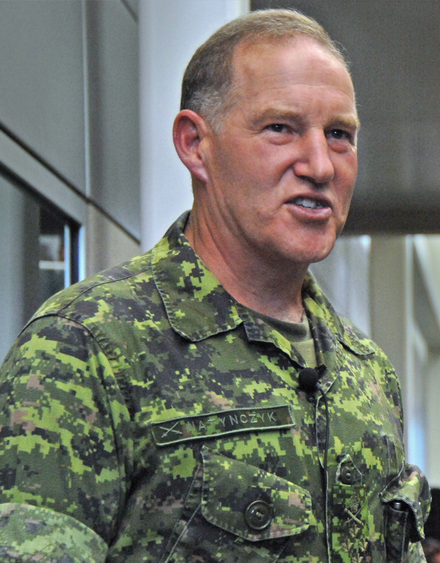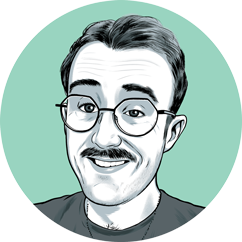
General Walter Natynczyk was named a member of the Order of Canada in 2024. [Wikimedia]
In an exclusive interview with Legion Magazine, Natynczyk discussed his pre-military life, career in the CAF and his recent Order of Canada.
About why he joined the CAF
What motivated me was the service of my parents, especially my father, who was a Polish WW II combatant. He had been ethnically cleansed from eastern Poland and survived 18 months in a Soviet gulag. With four of his remaining brothers, he then made it to Palestine, where they were trained by the British Army as part of the free Polish forces. He was later wounded in Italy before arriving in Canada.
My father passed away when I was nine, partly due to alcoholism as a way to treat his demons as a war veteran and gulag survivor. My mother, meanwhile, was on the opposite side of the war within the German air force. She was drafted in to operate aerial searchlights, but luckily, she was never on duty amid an attack.
My parents eventually met in Canada and set off on a truly Canadian life.
Having grown up with a sense of service, I joined the air cadets, which felt like a natural progression. I had an appreciation for the military, so I went from there.
My mother, however, had other ideas for me. She was always religious but became even more so after my father died. In her mind, my destiny was to become a priest. If not a priest, then she wanted me to be a carpenter. My mom never imagined that I’d join the military, yet I did, and she supported me, and it worked out just fine.
About the nickname “Uncle Walt”
I think it came about when I was commanding The Royal Canadian Dragoons out of Petawawa, Ont., and my sense is it’s because I sincerely care about my troops and their families. Yes, we had a mission to prepare for operations, to be the best we could be, and in terms of tankers, to be able to move, shoot and communicate while supporting our other forces. At the same time, back in 1996 to ’98, it was a difficult time for the Canadian Armed Forces after the Somalia inquiry.
I just wanted to maintain a good quality of life for my troops and their families while inspiring them to continue their service, recognizing that an individual’s departure from the military is usually a family decision. Whether it was as the commanding officer of The Royal Canadian Dragoons or any of my subsequent roles and appointments, I cared—and continue to care—about the troops, and I hope I made a difference in the lives of those sailors, soldiers and air personnel.
About his proudest pre-defence chief accomplishments
I’d say commanding The Royal Canadian Dragoons and making the lives of some 750 soldiers better. I remain proud of what we did during deployments on domestic operations, including the [1997] Manitoba floods and the [1998] ice storms within eastern Ontario. Those were not only significant domestic operations in their own way, but actually turned the tide in terms of the national mood and respect for the Canadian Armed Forces after the damage wrought following the Somalia affair.
The other high point was as the deputy commanding general of III U.S. Armored Corps in combat in Iraq, representing Canada as an exchange officer. I was one of the very few folks given oversight of about 35,000 soldiers in a very complex and chaotic environment. There, I thought I’d do my best to demonstrate Canadian generalship, Canadian leadership, in that unique environment. I also worked to make it better for those commands and those soldiers under my overwatch.
About serving with defence chief Rick Hillier
I was fortunate to have worked for General Rick Hillier as his [defence] vice chief. Our paths have crossed many times, and I think the greatest lesson I learned from Rick is [to take] bold and decisive action. General Hillier developed dynamic and effective plans. He led boldly, communicated effectively, and cared for individual soldiers in a way that they all knew they had support up and down the chain of command. His great courage in command was one of my biggest takeaways.
About his tenure as defence chief
It was a privilege of command. Like General Hillier and many others, you don’t aspire to that [position]. Coveting such positions too much may compromise your own values. In my case, I was initially reluctant going into the role, not least due to the fact my dream job was actually commanding The Royal Canadian Dragoons.
As part of my leadership lessons I share with folks, one of my lines is, “declare success early in order to remove the yoke of ambition from your shoulders.” You can then focus on your operational mission and your troops’ well-being while living your values. Throughout my entire career, I’ve put service before self.
If things are going well for all of the troops, continuity is what they want. Like a ship, moving “steady ahead” can increase the speed. Of course, during my tenure, it was Afghanistan and the [2010] Winter Olympics [in Vancouver]. While I was there, we had missions to Haiti and Libya and the Arab Spring also broke out. In January 2010, we had more than 12,000 sailors, soldiers and air personnel committed to or about to go on operations.
We were also taking care of people, especially the wounded, ill and injured. The reality is we rotated 40,000 troops through Afghanistan. The toll—both physical and mental health injuries—was huge. My time was often focused on caring for them and their families, ensuring resilience before, during and after deployment.
Domestically, we had floods and forest fires. Let me say, too, that I can never forget our search and rescue technicians saving three lives daily on average.
About the 2021 Taliban takeover of Afghanistan
Our men and women served courageously in order to make a difference for those in Afghanistan every day, as well as to ensure that terror could not be exported. I still remember seeing civil society thriving and young people going to school. It was all because of the courage, dedication, service and sacrifice of our folks. I’m very proud of what we were able to do while we were there, and I’m proud of the relationships [we had] with our allies as they were strengthened [in Afghanistan]. It was difficult [watching the Taliban takeover] and very sad for those troops that went through that [withdrawal] experience. I felt bad for our own troops who left parts of their hearts and souls in Afghanistan. I also felt sad for their families who made their own sacrifices, whose loved ones perished or were injured over there.
About his post-defence chief career
I felt honoured and quite privileged to serve as the president of the Canadian Space Agency, a position I held for about 15 months, and then as deputy minister of Veterans Affairs for around six-and-a-half years. I ended up applying a lot of the leadership lessons I had learned in the military to both of those departments. Much of it was about getting to know the people, delegating authority, empowering those people and trusting them to get on with business. I learned that in the CAF because you cannot micromanage in such a huge organization. You cannot even attempt to micromanage. I stopped these kinds of issues at the Canadian Space Agency while focusing on building bridges and moving the program forward.
At Veterans Affairs, we dealt with a perfect storm where the government had made spending and staffing cuts, which impacted us hugely, concurrent with the 40,000 sailors, soldiers and air personnel returning from Afghanistan service, many of whom were leaving the armed forces, a proportion with mental health injuries.
I went in [as deputy minister of the department] and laid out intent to apply care, compassion and respect to secure a better path [for our veterans]: care in treating every veteran like they’re family; compassion if you have to default in decision making because of our binary regulations; and respect in recognizing that you never push back on a wounded soldier, grieving family member or a medalled veteran. Simultaneously, it was about the notion of delegating power and trust.
About his hopes for the future of the CAF
I’m an eternal optimist. Over my 45 years of military and public service, I’ve seen many rises and falls, as well as resources coming in and out of the armed forces. But there’s been one constant: the quality of the people in the CAF. I believe that’s a reflection of the social services in our country, the high quality of education and universal health care, and the multicultural mosaic [of Canada]. Notwithstanding the problems—and, if you read the news as I do every day, you tend to become pessimistic—you realize that the young folks who are perhaps in the first half of their career are no different than we were upon joining decades ago.
I also have great trust in the leadership of the armed forces. I was actually at the Vimy Awards Gala [in November 2024], seeing the leadership of the armed forces and realizing that those were the same captains, majors, lieutenant-colonels and colonels who I oversaw 15 years ago, and they’re now generals and admirals.
I had great confidence in them years ago, and I have confidence in them still. That leadership, combined with those young folks now joining the CAF with that same sense of duty, that sense of being part of something greater than themselves like those who scaled Vimy Ridge in 1917, means that the elements are there for the CAF to be strong. The question is, “What does Canada want to do with that?”
On being appointed to the Order of Canada
I feel humbled. I feel fortunate to have served my country, the CAF, the Canadian Space Agency, Veterans Affairs, our troops and their families. It’s been a privilege. I’ve had an extraordinary career, and to be recognized for that is just the icing on the cake. I love the country in the same way that my mom and dad loved Canada, and I want to continue serving and contributing to this great nation that we have while inspiring others to serve.
This abridged interview has been edited for brevity and clarity.
Advertisement



















